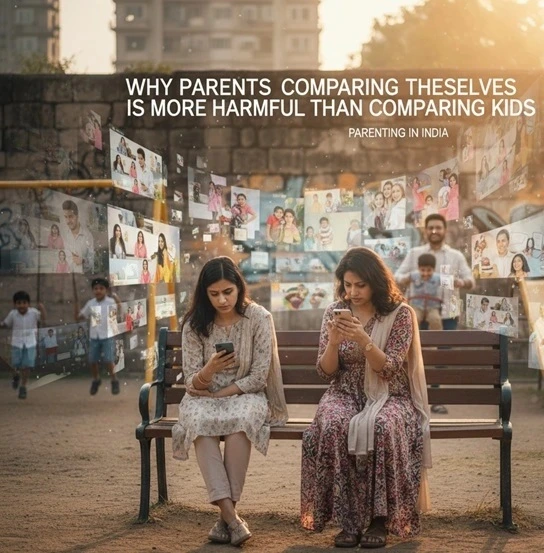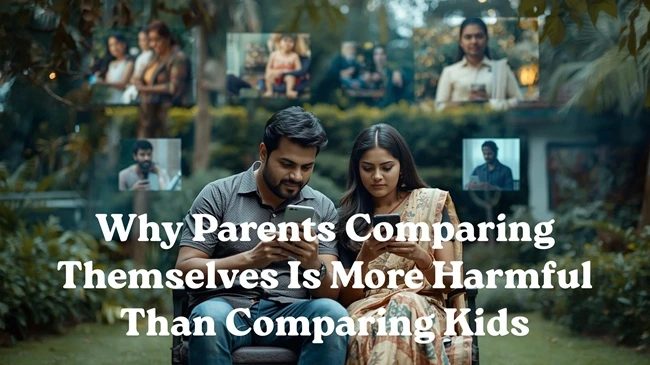The Hidden Competition Behind Closed Doors
Assume, It’s a typical Sunday afternoon in many Indian homes. Parents gather at a relative’s house or scroll through social media feeds filled with smiling family photos, children’s medals and holiday pictures. Somewhere between the laughter and compliments, a silent thought crosses a parent’s mind — “They seem to be doing better than us.”
In that single moment, an invisible comparison begins. Not between children, but between parents themselves — their lifestyles, parenting styles, their kids’ achievements and even how “sorted” their family looks from the outside.
This silent competition may seem harmless at first. But here’s the truth most Indian parents overlook – comparing yourself with other parents is far more damaging to your child than comparing your child with another kid.

The Shift from “My Child vs Their Child” to “Us vs Them”
For decades, Indian families have battled the curse of comparison. We’ve heard phrases like, “Look at Sharma ji ka beta,” becoming an unavoidable part of our upbringing.
But now, the trend has evolved.
Today, instead of comparing children, parents are comparing their parenting.
- “They take their child for music classes every weekend, maybe we’re not doing enough.”
- “Their daughter speaks fluent English, are we failing as parents?”
- “They’ve already started saving for international studies, maybe we’re behind.”
This subtle shift — from judging children to judging one’s own parenting — is emotionally exhausting and silently harmful for both the parent and the child.
How This Comparison Unknowingly Hurts Children
While parents may believe they’re just being responsible or motivated, this pattern of comparison seeps into daily interactions and influences how children grow up.
1. Children absorb your insecurities
Kids are extremely observant. When parents constantly feel “less than others,” children internalize this energy. They start believing that love, pride or happiness must be earned through achievement — not given unconditionally.
2. It builds pressure in invisible ways
When parents compare their lifestyles, activities or choices to others, children start feeling like their family needs to “catch up.” Even if parents never say it aloud, kids sense the unspoken tension — “We must do better, or we’ll disappoint mom and dad.”
3. It damages the child’s emotional security
Every child needs a sense of stability — that their parents are confident, content and emotionally grounded. When a parent’s self-worth depends on matching someone else’s life, children grow up in an environment of constant self-doubt and emotional fragility.
4. It limits individuality
When parents compare their approach to others, they may unintentionally force their kids into molds that don’t suit them. One child might love art while another excels at science — but when parents want to mirror another family’s “success formula,” the child’s true potential gets buried.
Why Indian Parents Fall into This Trap
Let’s be honest — in India, parenting isn’t just about raising children; it’s about maintaining social reputation. Family achievements are often equated with good parenting.
Here’s why Indian parents are especially vulnerable to this comparison trap:
1. Social validation matters deeply
From school WhatsApp groups to social gatherings, Indian parents often feel pressure to “look successful.” It’s not about showing off — it’s about not wanting to fall short in a society that celebrates visible results.
2. The rise of social media perfection
Instagram and Facebook have turned parenting into a highlight reel. Seeing other families post perfect vacation pictures, children’s awards or elaborate birthday setups makes many parents question their own efforts — unaware that most of these moments are curated, not real.
3. Cultural conditioning
Indian society has always celebrated comparison — as a motivator, not a problem. Parents were once compared to other parents in their youth and now they unknowingly pass down the same behavior, thinking it’s “normal.”
4. Competitive schooling system
Schools often emphasize rankings, trophies and achievements — feeding a belief that success is measurable. Parents extend this competitive mindset to their own parenting, trying to “measure up” against others’ lifestyles.
The Emotional Toll on Parents Themselves
Constant comparison doesn’t just harm children — it emotionally drains parents too.
- Anxiety and guilt become common. You feel like you’re not doing enough.
- Joy disappears from parenting. It becomes a performance rather than a shared experience.
- Relationships suffer, as couples begin to blame each other for not being “like other parents.”
This emotional exhaustion seeps into family dynamics. Conversations become transactional, laughter fades, and parenting turns into a checklist of expectations instead of an act of love.
How to Break the Cycle — Practical Steps for Indian Parents
Breaking out of the comparison trap isn’t about pretending not to notice others. It’s about redefining what “good parenting” truly means for your family.
1. Redefine success in your own terms
Ask yourself — what do you really want for your child? Is it happiness, confidence or social validation?
When you define success based on your values, not others’ standards, comparison loses power.
2. Limit exposure to unrealistic standards
Social media is not a parenting manual. Follow real, grounded parents who talk about struggles — not just glossy highlights.
3. Talk about feelings, not achievements
Replace, “Why didn’t you get a medal?” with “How did you feel during the competition?”
This small shift fosters emotional intelligence in your child — and relieves pressure from both sides.
4. Celebrate individuality
Your child doesn’t need to follow someone else’s path. Whether they love drawing, coding or cooking, help them explore their strengths without external benchmarks.
5. Practice gratitude as a family
End your day by discussing three things you’re grateful for — big or small. Gratitude resets the mind and helps you focus on what you have, not what you lack.
6. Remind yourself — parenting is not a competition
Every child has a unique journey. Every family has a different rhythm. The moment you stop competing, parenting becomes lighter, calmer and more fulfilling.
The Power of Self-Awareness
Parents who recognize their comparison habits are already halfway to breaking them. The key lies in self-awareness and acceptance.
It’s okay to admire other families — but it’s not okay to feel inferior because of them. Your child doesn’t need a perfect parent. They just need a parent who feels confident and content.
When you stand grounded, your child learns that self-worth comes from within, not from others’ opinions.
Conclusion – Be the Calm in Your Child’s World
In today’s fast-paced, show-and-tell world, children don’t need parents who are competing — they need parents who are content.
They need role models who show them that happiness isn’t found in comparison, but in authenticity.
So, the next time you see another parent’s achievements, smile for them — but remind yourself that your story, your struggles and your child’s journey are unique.
Because at the end of the day, the greatest gift you can give your child is not a perfect life — but a peaceful home.
For More Such Parenting Tips, Please Follow Popnewsblend.com

Hi, I’m Prashant Jain — a curious soul, storyteller, and content creator at heart.I’ve always been drawn to the world of entertainment, travel, sports, health & lifestyle — not just as a writer, but as someone who genuinely lives these experiences. Whether I’m binge-watching the latest OTT series, exploring offbeat spiritual destinations in India, or diving deep into wellness routines and cricket match insights, I love sharing what I discover with like-minded readers.
PopNewsBlend is my way of blending personal journeys with meaningful stories — ones that inform, inspire, and keep you ahead of the curve. Everything I write comes from real observations, hands-on experiences, and a deep passion for understanding the world around us.
Discover more from Popnewsblend
Subscribe to get the latest posts sent to your email.







